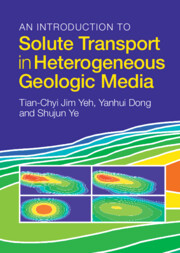Book contents
- An Introduction to Solute Transport in Heterogeneous Geologic Media
- An Introduction to Solute Transport in Heterogeneous Geologic Media
- Copyright page
- Contents
- Preface
- 1 Fundamental Concepts
- 2 Well-Mixed Models for Surface Water Quality Analysis
- 3 Well-Mixed Models for Subsurface Water Quality Analysis
- 4 Molecular Diffusion
- 5 Numerical Methods for Advection–Diffusion Equations
- 6 Shear Flow Dispersion
- 7 Solute Transport in Soil Columns
- 8 Parameter Estimation
- 9 Solute Transport in Field-Scale Aquifers
- 10 Field-Scale Solute Transport Experiments under Natural Gradient
- 11 Forced Gradient Field-Scale Tracer Experiments
- 12 High-Resolution Characterization (Tomographic Surveys)
- References
- Index
10 - Field-Scale Solute Transport Experiments under Natural Gradient
Published online by Cambridge University Press: 02 February 2023
- An Introduction to Solute Transport in Heterogeneous Geologic Media
- An Introduction to Solute Transport in Heterogeneous Geologic Media
- Copyright page
- Contents
- Preface
- 1 Fundamental Concepts
- 2 Well-Mixed Models for Surface Water Quality Analysis
- 3 Well-Mixed Models for Subsurface Water Quality Analysis
- 4 Molecular Diffusion
- 5 Numerical Methods for Advection–Diffusion Equations
- 6 Shear Flow Dispersion
- 7 Solute Transport in Soil Columns
- 8 Parameter Estimation
- 9 Solute Transport in Field-Scale Aquifers
- 10 Field-Scale Solute Transport Experiments under Natural Gradient
- 11 Forced Gradient Field-Scale Tracer Experiments
- 12 High-Resolution Characterization (Tomographic Surveys)
- References
- Index
Summary
Field tracer experiments in Borden aquifer in Canada and the Macrodispersion Experiment (MADE) Site, Mississippi, are reviewed. Both experiments injected tracers in aquifers and monitored their movements over fields at ten to hundred meters under natural gradient conditions. The behaviors of the tracer plumes at these two sites are distinctly different because the Borden aquifer is statistically homogeneous, and the aquifer of MADE is statistically heterogeneous. As a result, the validity of the classical ADE and non-Fickian dual-domain models becomes a contentious debate and deserves articulation of the differences between the ensemble mean nature of the models and the observations in one realization. The two experiments provided opportunities for understanding the limitations of applying solute transport theories and mathematical models based on soil-column experiments to real-world scenarios where heterogeneity is multi-scales, and groundwater flow varies spatiotemporally. Ignorance of the differences in scale of dominant heterogeneity and the observation, model, and interest scales is to blame. We explore and discuss the strengths and weaknesses of the theories and models.
Keywords
- Type
- Chapter
- Information
- Publisher: Cambridge University PressPrint publication year: 2023



